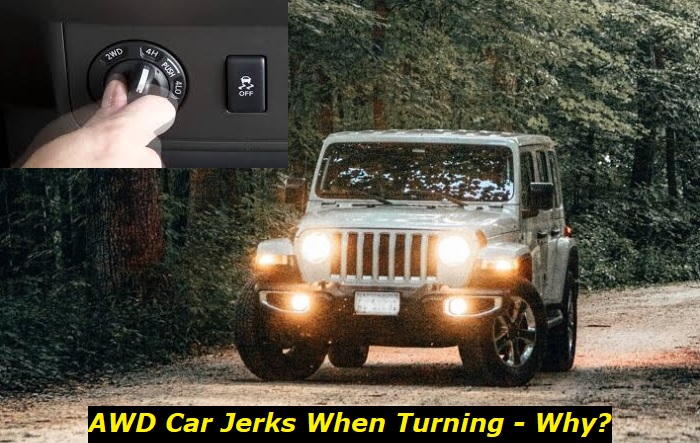You may have experienced the situation when your AWD car started jerking when turning. This is pretty common for such vehicles and doesn't always mean there is something wrong with the car. But you can play with settings and solve the issue. If the problem isn't solved, you should have your vehicle inspected because several technical issues may cause this effect.
Jerking in AWD mode is completely fine if you use the Lock function. This locks all 4 wheels dead and your car is working in 4WD mode with blocked differential. Also, 4WD cars will jerk when turning because they are always in Lock when in 4WD mode. This mostly happens because you are using the AWD mode incorrectly. Also, it may be a sign of a problem in the transaxle and differential.

Here's what I will cover in this article:
- AWD jerking when turning - maybe it's just your settings.
- Settings are fine but it's still jerking - what are the possible reasons?
- Can you drive when the car is jerking in turns?
- What should you try doing if the problem persists?
Let's get started!
AWD jerking when turning because of the settings
In most cases, the problem appeared because of the wrong settings and wrong use of the vehicle functions. When you turn in a car that you've set according to the road conditions, it shouldn't jerk. This could be the issue in older heavy-duty trucks that only had 4WD and should have been used carefully. But those are rather rare nowadays.
This problem is connected with the use of the differential lock. The differential is a special unit that allows the wheels on one axle to rotate at different speeds. This makes it easier for the car to turn - the inner wheel turns slowly while the outer one makes more rotations when the car turns. If you lock the differential, both wheels will rotate at the same speed.
Here's what happens:
- when you turn, your wheels can't rotate with the needed speed independently, so they keep rotating at the same speed;
- as the inner wheel rotates faster than needed, the tire starts slipping and this leads to jerking;
- you may not feel this much on wet roads or when you drive in snow because the wheel can just slip on such surfaces;
- also, this won't be the issue when you turn gently and your wheels don't fight with the differential;
- the sharper you turn the steering wheel, the worse is jerking because the difference in the needed speed of rotation is growing;
- once you release the steering wheel, the jerking stops bothering you and the car or truck just goes normally further.
The problem is that you've turned the 4WD mode or applied the Lock function to your differential when it wasn't needed. The Lock function is not available in all AWD cars. I would say that the majority of modern vehicles don't have it, especially if we are talking about SUVs. Trucks will still have this function and it may be turned on unintentionally just by hitting that button without noticing this.
Applying the 4WD mode is only a good idea when you are driving on harsh terrain, snow, ice, or whatever. If you apply this mode or turn on the Lock function when driving on a normal road, your car will jerk when turning. So, the first thing to do is to check whether those modes are applied and try turning them off.
What if Lock isn't applied but the car is still jerking?
First of all, you need to make sure that there are no other problems with the suspension or wheels. Also, you may need to take the car in and let a professional mechanic look at the differential and transaxle. It's important to not ignore the problem as it may lead to serious and expensive damage.
Here are the possible issues that may cause jerking:
1) Differential problems
The differential is exactly the unit that allows the wheels on one axle to rotate independently. This makes it possible for cars to turn. All cars have differentials but you will not know about that in a 2WD vehicle because this differential has no other functions and settings besides just working as it should.
In an AWD car, the differential may lock - manually or automatically - and this may be the reason for your problems. When the differential is stuck locked, the car will jerk when turning. This may happen because of the issues with sensors that control AWD or just because of some mechanical issues with the differential itself.
2) Control units or wiring
It's not uncommon for older cars to develop issues with the ECU and other control units. Also, the sensors and wiring may develop problems. This may affect the way your AWD works. Instead of using only two drive wheels, it may be stuck in AWD and may turn on the lock function without any reason for that.
If control units, wiring, or sensors malfunction, you aren't likely to repair your vehicle on your own. In most cases, you will need professional help for this.
3) Suspension problems
When your suspension is not in its optimal condition, the vehicle may experience problems when turning. Pay attention to the outer CV joints, suspension arms, steering system, and wheel bearings. Those things may cause jerking when you turn whatever the driver type is in your car. It may even be the front-wheel drive vehicle.
Jerking happens just because the suspension can't work well and compensate for the shocks. When the car is turning, there are several suspension parts that are under the load. This may also be accompanied by different sounds that prove suspension problems in the end.
4) Tires and wheels
One more simple problem for jerking when turning is wheel problems. For example, your wheel bolts or nuts may loosen a bit. It will be more or less fine when you drive straight but when turning, things go much worse. This is very serious and you shouldn't continue driving, in this case.
Also, poor tire pressure may lead to jerking when you turn. In this case, the car will put some load on one of the wheels (the outer one) and if this wheel doesn't have the needed pressure, you may eventually feel that it's jerking.
Can you drive when you feel the car jerking at turns?
It depends on why the car jerks. If the actual reason for this is the Lock mode that was unintentionally turned on, you can turn it off and keep driving. Even if the 4WD mode can't be disengaged, you can still drive further - there is little to no risk in this but the discomfort that you get when the car jerks.
But if you can't locate the reasons for this jerking and you are sure that this is something new and your car has never done this before, you should be careful.
Here's what can happen if you just keep driving:
- the suspension problem may appear to be serious and you will lose traction or control over the car;
- the issue with the tires can also lead to accidents because the vehicle won't obey your commands on the road;
- a broken differential is pretty expensive to repair and if you keep driving, you may even make the potential repair more expensive;
- eventually, such jerking may destroy the tires if you ignore this for quite a long time and the tires are not cheap now.
It's important to find the reason why your car jerks when turning. If the reason is natural like the 4WD mode, you should make proper settings to your vehicle and keep driving. But if there is an issue that you can't locate, you should stop the car and make sure that driving further is safe. Even if you decide to drive further, make it super slow and with the emergency lights on.
What can you try doing right there and then?
Well, there is nothing much you can do if the problem is serious. The only proper solution is to go to the repair shop. But if you want to get there on your own, without the expensive help of the tow truck, you should make sure it's safe.
For this, do the following:
- check the tire pressure - make sure all tires are properly inflated and aren't going to cause additional problems;
- check the wheel bolts - tighten them if you find any loose bolts or nuts;
- check the suspension - inspect everything you can see, grab and shake different parts of the suspension;
- check all the settings of the all-wheel-drive system and make sure that the differentials are not locked;
- check if there are no error codes and warning lights that may be telling you about a serious problem;
- if everything is OK, drive carefully and slowly on the right side of the road and turn on the emergency light.
Overall, jerking when turning in AWD cars is not a normal thing and you shouldn't ignore the issue. Go to a professional mechanic and ask them to inspect the car properly. This will help you make sure that everything is OK and ready to go. Also, you will be able to solve the problem that causes jerking.
About the authors
The CarAraC research team is composed of seasoned auto mechanics and automotive industry professionals, including individuals with advanced degrees and certifications in their field. Our team members boast prestigious credentials, reflecting their extensive knowledge and skills. These qualifications include: IMI: Institute of the Motor Industry, ASE-Certified Master Automobile Technicians; Coventry University, Graduate of MA in Automotive Journalism; Politecnico di Torino, Italy, MS Automotive Engineering; Ss. Cyril and Methodius University in Skopje, Mechanical University in Skopje; TOC Automotive College; DHA Suffa University, Department of Mechanical Engineering






Add comment